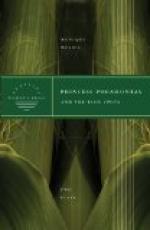“Come,” he said, “since thou canst understand our words, come and eat in the lodge of the Pamunkeys.”
And Smith, ignorant of when death might fall upon him, followed. That day they feasted him, and the half-starved Englishman ate heartily for the first time since he set foot in the new world. At least he had gained strength now to bear bravely whatever might await him. The next day he was bidden accompany them, and they marched swiftly and steadily for many hours through the forest to Orapeeko. It may be that Opechanchanough’s messengers had informed him mistakenly that Powhatan was at that village which, after Werowocomoco, he most frequented; but on their arrival there they found the lodges empty except the great treasure-house full of wampum, skins and pocone, the precious red paint used for painting the body. This was guarded by priests, and while Opechanchanough talked with them. Smith marvelled at the images of a dragon, a bear, a leopard and a giant in human form that ornamented the four corners of the treasure-house.
Evidently the priests were giving the werowance some advice. Smith wondered whether the savages offered human sacrifices to their Okee and if such were to be his fate. But the night was passed quietly there; the next day was spent in marching, and the following night in another village. Everywhere he was the object of the greatest interest: braves, squaws and children crowded about him, fingered his clothes, pulled at his beard and asked him questions. The Englishman observed them with the same interest. He noticed how the men wore but one garment leggings and moccasins made in one piece, and how they were painted in bright colors, many wearing symbols or rude representations of some animal which he learned was their “medicine.” He watched the women as they embroidered and cooked, tanned hides and dyed skins, scolded and petted their children. Their lodges were lightly built, he saw, yet strong and well-suited for their occupants. Many of the young men and maidens made him think of deer in the swiftness of their movements and in the suppleness of their bodies.
After many days of travelling, in which Smith believed that they often retraced their steps, they found themselves one afternoon at the outskirts of a larger village than any they had yet entered. Dogs barked and children shouted as they neared the palisade, and men and women came running from every side.
“Certainly,” thought Smith, “we are expected. Never in an English village have I seen a Savoyard with a trained bear make more excitement than doth here Captain John Smith.”
[Illustration: Decorative]
CHAPTER VIII
POCAHONTAS DEFIES POWHATAN
“Princess, Pocahontas!” cried Claw-of-the-Eagle, as he pointed excitedly to the outskirts of the village, “look, yonder come thy uncle and his men bringing the white prisoner with them.”




